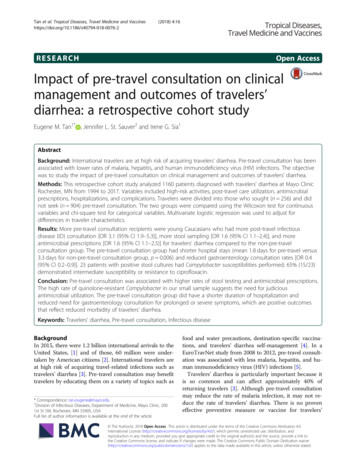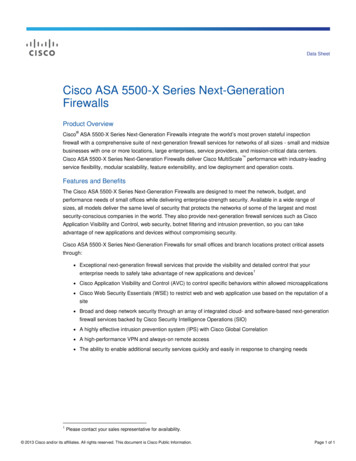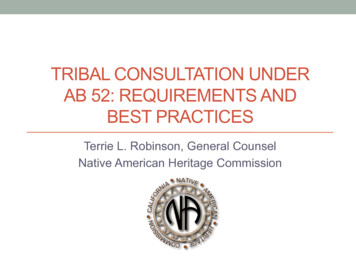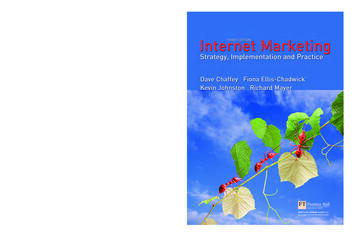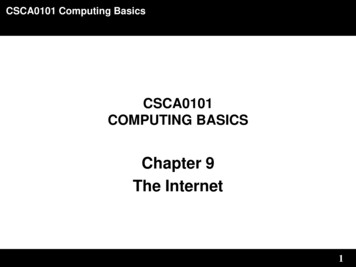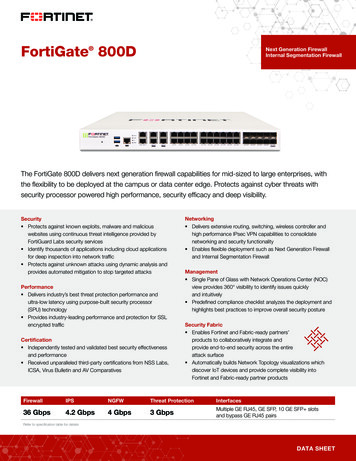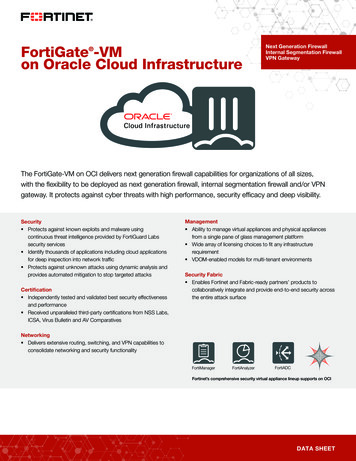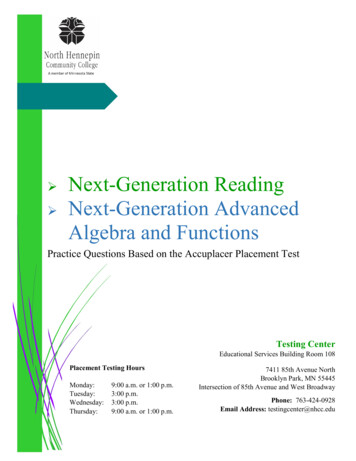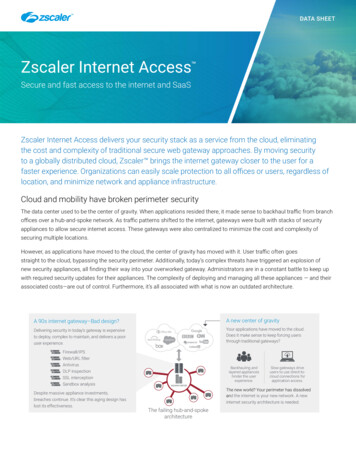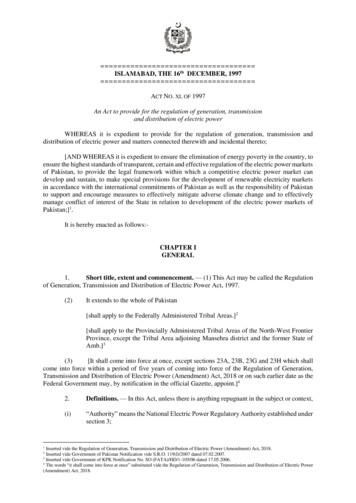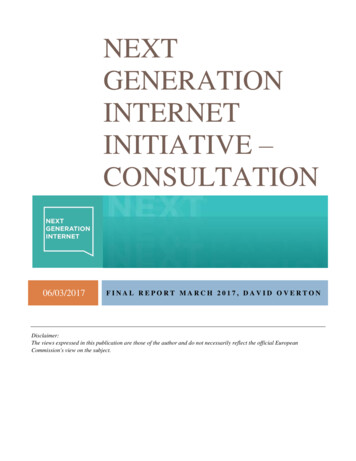
Transcription
NEXTGENERATIONINTERNETINITIATIVE –CONSULTATION06/03/2017FINAL REPORT MARCH 2017, DAVID OVERTONDisclaimer:The views expressed in this publication are those of the author and do not necessarily reflect the official EuropeanCommission's view on the subject.
Next Generation Internet Initiative – ConsultationExecutive Summary:The open consultation for the Next Generation Initiative (NGI) was heldbetween 10th November 2016 and 9th January 2017. 449 people took partwith significant input. Participants were asked to rate and comment upon theimportance of value statements and technology areas and encouraged for theirviews on how to support the NGI.ValuesEnsuring citizens' sovereignty over their own data and the protection of theirprivacy is deemed the most important value proposed in the survey by theparticipants. Secondly, participants also felt strongly that the Internet shouldensure diversity, pluralism and a right to choose. Thirdly, the concentration ofdata in a few proprietary platforms is understood as a significant issue today.Internet should ensure citizens' sovereignty over their own dataand protect privacy.Those rating the importance of this value highest also selected Personal DataSpaces as a very important technology area. Therefore an NGI with a focuson Personal Data Spaces (Technology Area 3) may help in addressing theissues of sovereignty over data.Similarly important across all participant categories this value would make anattractive vision to pursue to attract participation.Internet should ensure diversity, pluralism and a right to choose.Those that considered this value strongest also consider that Personal DataSpaces is very important and Distributed Architectures and decentralised datagovernance (Technology Area 4) is next biggest.Internet should avoid the concentration of data in a fewproprietary platforms.There is a close relation between this value and the technology area ofPersonal Data Spaces (Technology Area 3). There is strong awareness of theimpact of the few proprietary platforms upon the protection of personal datain particular. Software defined technologies (Technology Area 5) is thesecond most important technology area for those that hold this value.Page 1
Next Generation Internet Initiative – ConsultationThis value is popular among those already engaged in research funded by theEuropean Commission. This can be useful if progression upon existinginitiatives is desired.Other visionsOther visions proposed drew considerably less interest, however some had anappeal to certain niches within the consultation. Younger participants wereattracted to values of diversity and pluralism and the notion of a level playingfield, where older participants preferred values relating to sustainability,resilience and security and a resistance to concentrating data in proprietaryplatforms. Respondents from Greece, Belgium and Bulgaria felt stronglyabout a resilient and secure internet. Those from Sweden, Greece and Irelandresponded more strongly to sustainability than other more dominant countriesin the consultation (e.g. UK, Italy, Spain).Beyond the vision statements proposed in the consultation, participantsproposed that a trusted, inclusive internet should be seen as a basic humanright and the NGI should be mindful of the protection and safety of its usersand their data. However, they also recognise the tensions between this and thedesire for more unencumbered innovation.Technology AreasThe top three values above were consistently and strongly held by thosesupporting the most important of the technology areas.Technology Area 3 (Personal Data Spaces) and Technology Area 7 (ArtificialIntelligence) were the most important areas as recognised by researchers andthe bulk of the other groups that took part in the consultation.Personal data spacesThere is a trade-off between the benefits of innovation possible with theInternet of Things and Big Data and the need to prevent abuse of personaldata.The NGI needs to keep personal data secure and this means educating andenabling citizens regards criminals and big business. Systems that allowassurance, transparency and freedom for citizens to control the data that's heldon them should not limit access to innovative services.Infrastructures are needed to both enable benefits and minimise exploitationof using personal data. This will include enabling privacy aware accesscontrol and enforcing accountability for responsible use of personal data.The values this group related most to were those of sovereignty over data andPage 2
Next Generation Internet Initiative – Consultationdiversity, pluralism and the right to choose.Artificial IntelligenceDespite only a few respondents actually working in this area, many morebelieved they had a good understanding of the area. Their visions are stronglyin line with retaining data sovereignty, diversity and pluralism and notallowing the data to become concentrated in proprietary platforms.Technical challenges top the list, requiring interdisciplinary approaches and atop-down vision and application of strong use cases (e.g. autonomousvehicles) to shape the needed activities. The impact of greater autonomy andincreasing "responsibilities" placed on systems requires work oncommunication, ethics and the inclusion of human factors within thesedecision "making" mechanisms. A proper and actionable ethical frameworkfor Artificial Intelligence regarding algorithms becomes essential anddeserves long-term project commitments to put some already welldocumented theory into practice.Distributed architectures and decentralised data governanceParticipants expressed the potential for a financial revolution from thesetechnologies. A number of specific requirements including the continuance ofwork on blockchain in particular and the need to deal with the powerdemands for this technology area proposed.The main challenges identified were in Communicating the business benefitsof these digital ledger technologies to existing businesses in a compelling wayand collaborating on new decentralised algorithms. Control for citizens overtheir own data becomes increasingly important yet challenging in adistributed architecture. Investment is needed into a diverse future-proofinfrastructure that will enable ever greater autonomy.For all this technology investment is needed to support effective governancethat balances rights and supports legislation. A multi-disciplinary approach isessential.Other technology areas proposed in the consultationDiscovery and identification tools need to provide assurance that the use andsecurity of personal data is standardised and respected far beyond the initialcommercial interest. Non-proprietary, extensible, future-proof, trustworthystandards for the Internet of Things are needed to support end to endconnectivity between the Internet and the edge networks connecting all thesedevices. Semantic repositories are needed.Page 3
Next Generation Internet Initiative – ConsultationNew forms of interactions and immersive environments face the issues ofdata privacy, diversity and the concentration of data into proprietaryplatforms. Intuitive interfaces necessitate work on understanding thepsychological & biological effects and the threats and opportunities forindustry and citizens of the constant Virtual Reality world. Supportingindustry 4.0, embracing immersive distant collaboration and creating marketdriven products and service are required. An NGI is needed that deals withthe packets reliably and with minimal latency. Work is needed in developingthe tools for work-flow and process improvements including the advancementof battery technology.The NGI can be made robust if the agility possible with the Software definedtechnologies is embraced and the right methodologies are employed for smalland medium-sized enterprises to take a role in this. Co-developments mayfulfill requirements for virtualisation and self-adapting algorithms. Theprotection of such created knowledge will be important. Work on newsoftware specifications is essential as more functionality becomes embeddedin soft rather than hardware. Standards need to be future-proofed toaccommodate unknown future functionalities that will be required.Networking solutions beyond IP impact the values of sovereignty of data andpluralism and diversity most strongly. An emphasis on security aspectsalongside the palpable need for an improvement over the current IP isjustified. The Next Generation Internet may benefit from a non-packet-basedapproach, but backward compatibility issues must be addressed and anoptimal migration path proposed. Higher throughput, low latency and securecommunications will place significant challenges upon the NGI infrastructureand architecture. A new high-speed TCP protocol and tools are importantareas in need of development. New networking approaches may demand thatsecurity is built within the protocol. Maximising security and resilience whileassuring good interoperability are key technical challenges.Other important technology areasAdditional technology areas proposed highlight a focus on security in generaland then more specific themed technologies around applying autonomoussystems to Smart cities and Smart citizens. The desire is for trusted systems tobe developed and language technologies are strongly seen as an importantinvestment to achieve this.Beyond this, simulation and large experimentation, as well as more hardwareorientated projects such as robotics, are proposed as alternative technologyareas.Page 4
Next Generation Internet Initiative – ConsultationTypes of research, who should do it and initiatives to followAn analysis on the type of research, actors and initiatives reveals an appetitefor collaboration among interdisciplinary groups engaged in a mixture of longterm and applied research projects.Foresight should direct research and guide the exploitation of evolutionaryresults into today's technology. Transdisciplinary approaches are needed.Importantly research needs guidance by the social sciences, user needs andawareness of the "known holes" in the current internet.The "citizens" involvement as "actors" in the research is crucial. This mayinclude representative bodies, policy makers and regulators but these need toencompass women, students and activists.Relevant initiatives exist within established institutions and are often fundedthrough national and EC programmes. The most popular in the consultationinvolve Smart initiatives, 5G, Internet of Things and language technologies.Initiatives that address Policy and Societal issues should embrace peernetworks, digital learning, e-democracy, e-procurement and e-learning.Finally, the identified on-going work on Public Sector Information (PSI), BigData and Networking may provide good starting points for prototypes."The internet should be a place for citizens to create and contribute toglobal society, not merely consume and 'like' content. Citizens shouldhave agency, not 'be the product."Page 5
Next Generation Internet Initiative – ConsultationNext Generation Internet Initiative– ConsultationFINAL REPORT MARCH 2017Table of ContentsValues . 1Internet should ensure citizens' sovereignty over their own data and protect privacy. . 1Internet should ensure diversity, pluralism and a right to choose. . 1Internet should avoid the concentration of data in a few proprietary platforms. . 1Other visions . 2Technology Areas (TAs) . 2Personal data spaces . 2Artifical Intelligence . 3Distributed architectures and decentralised data governance. 3Other TA's proposed in the consultation . 3Other important technology areas . 41.0 THE CONSULTATION . 81.1 What is the NGI Consultation? . 81.2 Who took part? . 81.21 Country analysis - Where do participants live at the moment? . 81.22 Demographics . 91.23 Sector Analysis . 92.0 UNDERSTANDING THE VALUES . 102.1 Overview of the value statements . 102.2 Internet should be more human - social, easy, immersive, emotional. . 122.3 Internet should avoid the concentration of data in a few proprietary platforms. . 122.4 Internet should ensure diversity, pluralism and a right to choose. . 132.5 Internet should ensure citizens' sovereignty over their own data and protect privacy.142.6 Internet should be more inclusive, participatory and transparent. . 162.7 Internet should be a level playing field for new entrants and new economic models. 172.8 Internet should be more resilient, secure and safe, especially for children, elderlyand people with low digital skills. . 18Page 6
Next Generation Internet Initiative – Consultation2.9 Internet should be a real agent of change towards sustainability. . 192.10 Additional Statements . 192.11 Conclusion on understanding values . 213.0 UNDERSTANDING THE TECHNOLOGY AREAS . 233.1 Overview of the technology areas . 233.2 TA 1 Discovery and identification tools - . 243.3 TA 2 New forms of interactions and immersive environments . 283.4 TA 3 Personal data spaces . 313.5 TA 4 Distributed architectures and decentralized data governance . 353.6 TA 5 Software defined technologies . 393.7 TA 6 Networking solutions beyond IP . 423.8 TA 7 Artificial Intelligence . 453.9 Additional important technology areas . 493.10 What type of research and who does it . 533.11 Conclusions on Understanding the Technology Areas . 574.0 CONCLUSIONS FROM THE CONSULTATION . 584.1 Values . 584.2 Technology Areas . 60ANNEX 1: INITIATIVES LISTED AGAINST EACH TA . 66ANNEX 2: CHALLENGES BY TA . 77ANNEX 3: THE OTHER TYPES OF RESEARCH PROPOSED . 151ANNEX 4: RESEARCH ACTORS RECOMMENDED BY PARTICIPANTS . 152ANNEX 5: KEY RESEARCH INITIATIVES IN YOUR ORG. OR COUNTRY . 154Page 7
Next Generation Internet Initiative – Consultation1.0THE CONSULTATION1.1 What is the NGI Consultation?The Next Generation Internet (NGI) consultation took the form of an on-line questionnaire stimulated byvarious events, blogs and social media activities between 10th November 2016 and 9th January 2017. Theconsultation falls into two parts, Values and Technology areas, and this report is divided accordingly.Section 2 reports on responses to questions regarding value statements concerning the internet. Section 3deals with the seven technology areas of the consultation.1.2Who took part?As an open consultation there was a broad range of respondents. 449 respondents took part.1.21Country analysis - Where do participants live at the moment?The consultancy was largely dominated by the Western European countries with little response from Balticand Eastern European states. The people who are living in the UK provided the most respondents with 60.A minority of 36 of the 449 participants are living in countries outside of the EU. Of these Switzerland wasthe highest with 11. 4 respondents from Norway took part also but all other countries (including USA,Turkey, Brazil, Japan, UAE, Azerbyjan, Israel, Nigeria and Tunisia) fielded 1 response only.Page 8
Next Generation Internet Initiative – Consultation1.22 Demographics27% of the respondents were female, a figure broadly in-line with the sectors in question. 25% of therespondents are currently below the age of 35. At least 71% of the respondents will still be below the age of60 in 2027.1.23 Sector Analysis38% of the respondents are researchers, 19% from civil society (including NGOs, freelancers & citizens) and18% are SMEs. 47% had previously applied for or taken part in a Horizon 2020 research and innovationproject. Of those that had not, the UK represented the largest group with 39 of their 60 participants neverhaving applied or taken part in H2020 projects.Page 9
Next Generation Internet Initiative – Consultation2.0 UNDERSTANDING THE VALUES2.1Overview of the value statementsEight areas of interest were tested. These took the form of statements to which the participants were asked torespond. These are below and then expanded upon in the subsequent sections of this report. Internet should be more human - social, easy, immersive, emotional.Internet should avoid the concentration of data in a few proprietary platforms.Internet should ensure diversity, pluralism and a right to choose.Internet should ensure citizens' sovereignty over their own data and protect privacy.Internet should be more inclusive, participatory and transparent.Internet should be a level playing field for new entrants and new economic models.Internet should be more resilient, secure and safe, especially for children, elderly and people withlow digital skills.Internet should be a real agent of change towards sustainability.Participants were asked to provide additional value statements.Clearly the statements cover some very important areas according to the responses. Each respondent had torate the importance of each topic area on a scale of 1-5 where 5 was the highest importance.Page 10
Next Generation Internet Initiative – ConsultationThere was a strong response to the statements posed in the consultation as each of them gained the highestscore for importance from at least 25% of the participants (see the spread in the above graph). In order, thehighest response was towards the following 3 statements;1. Internet should ensure citizens' sovereignty over their own data and protect privacy. 336 voted this ofhighest importance.2. Internet should ensure diversity, pluralism and a right to choose. 295 voted this of highestimportance.3. Internet should avoid the concentration of data in a few proprietary platforms. 290 voted this ofhighest importance.Below are the outcomes of the consultation against each of the statements.Page 11
Next Generation Internet Initiative – Consultation2.2 Internet should be more human - social, easy, immersive,emotional.2.21 OverviewThe value statement that the internet "should be more human - social, easy, immersive, emotional" wasconsidered of highest importance by 128 participants (28.5% of 449 total participants).2.22 Analysis by respondent's sector52.3% of the respondents rating this highest for importance were researchers. The SME's in this categoryrepresented 24.2% compared with 22.0% overall in the consultation.2.23 Analysis by country15 living in Belgium, 7 living in Bulgaria and 5 living in Finland rate this value of highest importance. Allother countries applied a lower importance to it.2.24 Analysis by ageThe group rating this of highest importance are in the older age brackets. 31.3% are in group 51-65 (vs22.9%) and 8.6% over 65 compared (vs 6.0%).2.25 Analysis by experience of Horizon 202051.6% have taken part in Horizon 2020 projects (vs 46.5%).2.26 ConclusionThis value statement appealed to just 28.5% of respondents to the consultation. The appeal is felt mostly bythe older age group research community who have previously had involvement with Horizon 2020. Thisvision statement therefore is going to appeal more to the researchers in the older age brackets involved withexisting projects.2.3 Internet should avoid the concentration of data in a fewproprietary platforms.2.31 OverviewThe value statement that the internet "should avoid the concentration of data in a few proprietary platforms"is the third strongest view in the consultation with 65% rating its importance as high (290 participants). It isvery close in score to the value on diversity and pluralism (see later) and was the second strongest value forthose considering distributed architectures as the most important technology area.2.32 Analysis by respondent's sector48.5% of respondents that consider this value of highest importance were researchers. Industry (ICT andother) both rated this highly as 69.2% of their participants considered this value of highest importance.Page 12
Next Generation Internet Initiative – Consultation2.33 Analysis by country35 each living in Spain, Italy and the UK considered this most important. Of these Spain is proportionatelythe highest scoring (35 of their 46 participants). A high proportion of the Scandinavian countries also ratethis highly (Denmark 12/15, Sweden 5/8, Finland 7/10).2.34 Analysis by ageThe concentration of participants, as with all these analyses, is in the middle age band (35/50) is 45.5%compared with the average for the consultation (46.3%). The younger age group (18/35) is fully 4% belowthe average at 22% indicating that this value appeals to the older respondent (32.4% compared with 29.3%).2.35 Analysis by experience of Horizon 2020This group is more experienced with Horizon 2020 than the average group with 49.0% having been involvedwith projects previously compared with the average 46.5%.2.36 Relation to Technology AreasTechnology Area 3, Personal Data Spaces, was the most important technology area for this group with81.0% voting this area very important. Technology Area 5, Software defined technologies, was the next mostimportant with 61.4%.Avoiding the 'concentration of data in a few proprietary platforms' is the third most important value overall.However, it appears relatively more important in 'distributed architectures and decentralised data governance'(Technology area 4), where it is the second most important value.2.37 ConclusionOverall this is the third most popular value and is clearly an important area.There is a close relation between this value and the Personal Data Spaces (PDS), Technology Area 3.Comments from many participants reveal a strong concern over the impact of these few proprietaryplatforms and the protection of personal data. Those that valued this statement highest rated PDS andSoftware defined technologies the most important TAs.The higher age profile and the familiarity these participants have with Horizon 2020 means this value isperhaps likely to attract those already engaged in research funded by the EC. This can be useful ifprogression with existing projects is desired.2.4Internet should ensure diversity, pluralism and a right to choose.2.41 OverviewThe value statement that the internet "should ensure diversity, pluralism and a right to choose" is the secondstrongest view in the consultation with 66% rating its importance as high (295 participants).Page 13
Next Generation Internet Initiative – Consultation2.42 Analysis by respondent's sector48.7% of those who rated this of the highest importance were researchers (consider that 38% of allparticipants were from research institutions).2.43 Analysis by countryThe top 3 responders live in Italy, UK and Spain. 38 respondents living in Italy rated this as the highestimportance, 36 in the UK and 33 in Spain. Of these, proportionately Italy is the most keen on this area with75% of their respondents. By contrast France's score was just 51% of the respondents.2.44 Analysis by age26.4% of respondents finding this value of highest importance were between the ages of 18 and 35, 43.4%were 35-50 years and 30.2% were over 50. This indicates that the value attracted a slightly younger group ofparticipants.2.45 Analysis by experience of Horizon 202045% of these respondents had experience of Horizon 2020 projects.2.46 Relation to the Technology Areas81.0% of this group stated Technology Area 3, 'Personal Data Spaces' was very important. Next highest wasTechnology area 4, 'Distributed Architecture and decentralised data governance', with 57.6%.2.47 ConclusionAs the second most popular of the value statements this is clearly an important value.Those that considered this value strongest also consider that Technology Area 3, Personal Data Spaces, isvery important and Technology area 4, Distributed Architectures and decentralised data governance is nextbiggest.It is also noteworthy that the value appeals to a younger demographic. The dominant sector for therespondents is research and academia.2.5 Internet should ensure citizens' sovereignty over their own dataand protect privacy.2.51OverviewThe value statement that the internet "should ensure citizens' sovereignty over their own data and protectprivacy" is the strongest view in the consultation with 75% rating its importance as high (336 participants).Page 14
Next Generation Internet Initiative – Consultation2.52Analysis of the respondent's sectorsOf those that scored this as the most important statement 49% were researchers (vs. 38% taking part), sothere is a clear academic interest in working on this area.2.53 Analysis by countryOf those that scored this as the most important statement 41 currently live in the UK (68% of all UKrespondents) and 37 in both Italy (51 total) and France (41). So proportionately France responded thestrongest amongst the largest responding nations.2.54 Analysis by ageTo analyse the differences in attitudes toward the value statements I have taken the two younger age groups(together 18-35) and the two older age groups (51 to over 65).With the younger group there was a strong agreement with the leading two statements. 85 of the 111participants in this age group rated sovereignty over data as the highest importance and 78 of them rateddiversity and pluralism at the highest importance. This is in-line with the overall survey results.In the older group there was strong agreement on the sovereignty of data (102 of 130 respondents), but thesecond most important area was seen to be that the internet should avoid concentration in proprietaryplatforms (93).The evidence for these most popular value statements is that there is consistency across the age groups onthese value statements.Page 15
Next Generation Internet Initiative – Consultation2.55Analysis based on experience of Horizon 2020For those who had NOT previously taken part in H2020 projects (potentially a new audience) I analysed thetop values statements. Again Sovereignty over data was the highest importance (181 of 240 respondents)with Diversity and Pluralism second (162).2.56 Relation to Technology Areas86% of those rating this value highest also considered Technology area 3 'Personal Data Spaces' as a veryimportant area for research. Technology areas 4 (Distributed architecture and decentralised data governance)and 7 (Artificial Intelligence) are joint second in terms of importance, each with 55.1% the group statingthese technology areas very important.2.57 ConclusionIt's clearly demonstrated that this value statement is deemed the most important of the survey according toparticipants.Those rating the importance of this value highest also selected Personal Data Spaces as a very importanttechnology area. The strong correlation suggests that providing a focus on personal data spaces may addressthe issues of sovereignty over data.Analysis by age, sector, country or experience demonstrates this is a consistent view. Analysis of those thathave not taken part in H2020 projects also indicates this would be an attractive vision to pursue to attractnew participants.2.6Internet should be more inclusive, participatory and tra nsparent.2.61Overview199 (44.3%) respondents considered this at the highest lev
06/03/2017 F I N A L R E P O R T M A R C H 2 0 1 7 , D A V I D O V E R T O N Disclaimer: . European Commission's view on the subject. Next Generation Internet Initiative - Consultation Page 1 Executive Summary: The open consultation for the Next Generation Initiative (NGI) was held . Intelligence) were the most important areas as .
